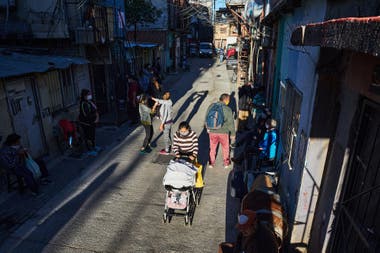The cell phone does not stop ringing. Missed calls and messages from impatient users who demand the service fall like stones. It is 9 am. Hayder sits at his desk, turns on the computer, and sighs. “Surely the power went out in some sector or a cable was cut,” he speculates.
Hayder Armin Flores (29), who together with two friends put together a entrepreneurship to provide connection to Internet to families of the villa 21-24, never has a day the same as another. Something always happens that prevents boredom and avoids routine.
Once he checks the network, he notices that there are anomalies in a section. “What the fuck!” He blurts out. She gets up, takes the tools, carries the black ladder over her shoulder, opens the door and begins her journey in search of an urgent solution. Know what has a great responsibility on his back: your clients are not being able to connect to classes, take turns, send emails, pay bills and recharge the Sube card. For these hours, they have to settle playing “Dino T-Rex”, the popular dinosaur game that appears on the screen when there is no connection.
Hayder walks, with a sure and straight step, through the corridors of the village that he knows so well. His beard is unkempt and his hands are large and rough. Self-taught and always ready to greet all the people who cross it. Bothers him chinstrap -He takes it off his nose constantly- and moves forward avoiding the sewer pits. He stops and looks up: “It sure is here,” he says. Support the ladder on a half-plastered wall and climb until you reach and open a gray box full of connected cables. He checks one by one and finds that there is a wire that is burned. “This is the one that causes interference and that means that nobody has Internet, “he explains. He changes the card, lowers his chinstrap, closes the box. He picks up the phone, calls a client.
-What are you doing? It is to know if she raised the signal.
He says yes. “Good”, completes and wipes the perspiration from the forehead. Go down and put on the chinstrap. He slings the ladder back on his shoulder – his faithful companion – and starts back to his room-office. He doesn’t realize it, but he’s smiling. Some sailed again and left the “Dino T-Rex” behind.
Hayder grew up in the village 21-24 and suffered firsthand from connectivity problems. In his time, he visited cyber shops a lot, those commercial premises with dozens of computers that were all the rage in 2005. His experience encouraged him to want to break with the digital divide in the neighborhood, where no large company offers service and it doesn’t even go in. “I always wanted my family to have better access to the Internet. My sisters suffered every time they needed to search for information for some practical work,” she says.
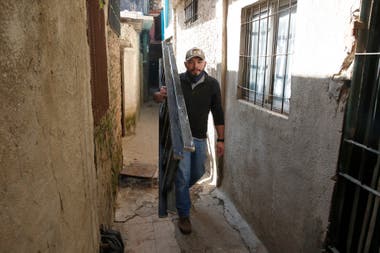
Without having much knowledge of networks, he began to investigate to achieve a higher browsing speed. Realizing that he could do more, he ventured to connect neighbors and family: a few 200 households hired your service. There are three other ventures that do something similar.
Every day, he bumps into very harsh realities. “Most of the families are large. And sometimes, they only have one cell phone that everyone uses. Also, you need credit and it is quite expensive at the moment, especially when you do not have a permanent job,” he remarks.
“In one family,” he relates, “there was a boy who since the pandemic began he had no connection with his teachers. We were able to connect him and when he entered Zoom’s class, he was emotional.”
According to data from the Observatory of the Argentine Social Debt (ODSA) of the UCA, in 2019, 23% of households in the marginal strata did not access any type of Internet connection, either fixed in the home or through mobile devices .
Most of the day, Hayder spends his time answering questions from users on topics related to routers, Wi-Fi, repeaters, Google, Netflix, and network cables, among other matters. They are all terms that, until a few years ago, the people of these popular neighborhoods had never heard of names. With the pandemic, and the consequent need to support distance classes and virtual jobs, the shortcomings intensified that always existed in connectivity for the most vulnerable sectors. Now they also jeopardized the right to education and decent work for a large part of the almost 100,000 inhabitants of this popular neighborhood in the south of the City.
Hayder says that when they connect the Internet in a house for the first time, people fill them with questions: from whether they have to plug the cell phone into the device or if it disconnects when they leave the house, among many other similar doubts.
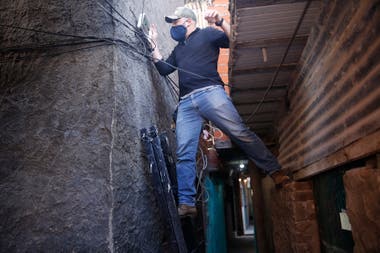
Entrepreneurship
The control center of the venture, which the friends christened Simple Wifi, is on the second floor of Hayder’s parents’ house. From there, he and his partners set up the network to various areas of the neighborhood, a great web of connection. Each user has a router that receives the signal and connects to the wireless devices in the house. Simple Wifi buys the Internet service from a wholesale company that is responsible for laying fiber optics to the villa.
The project started four years ago. “Like all beginnings, it was not easy,” Hayder confesses, and remarks that many times they had to ask their relatives for financing. Nights without being able to sleep, weekends without rest and a lot of risk of losing the investment.
Today they have everything armed: solar panels with batteries and even a generator in case the power goes out, next to the small office from where they monitor all the movement of the network. “Our goal is to continue reaching more families. If we get help from a company or the State, it would be much better. We aim for an equal connection for all,” she dreams.
The work is very complex and dangerous at the same time, due to all the irregular electricity connections that exist. “We are from the neighborhood, we know the needs. We charge a necessary percentage to be able to continue paying for the wholesale service that is given to us and to buy new devices to improve day by day,” he clarifies. And he adds: “We don’t pretend to be millionaires with this.”
A necessary connection
Back home, Hayder leaves the ladder against the wall and goes to the kitchen to pour himself a glass of water. It’s 11:30 and the temperature is rising. He adjusts his visor, looks at his watch. Check the messages on the cell phone. “I have to go out again,” he laments. While there are usually no more than five or seven trips a day, or sometimes none at all, the demand for claims increases when it rains.
Again, to walk through the labyrinthine corridors, with dirt streets dotted with the murky water that comes out of the blind wells. He begins to climb a spiral staircase that has been unpainted, like almost all those in the place. He knocks on the door and on the other side he is greeted by Gladis Mereles (25). She is a nurse, is finishing her Bachelor’s Degree in Nursing at Favaloro University and lives with her mother and brother.
-I came to check your router.
-Finally! Because I am missing the Nursing Service Management II class.
Hayder puts alcohol on the gel. Gladis smiles. Her hand is resting on the table-desk, her hair is tied back and her eyes are outlined. To the side, the sun comes in through the window and makes the blue ceramic floor shine. There are also old and new notes; books, brushes and paint chips on the floor. Two dogs run around like they own the house.
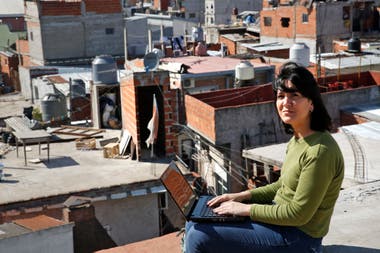
“Many times I thought about postponing subjects. Without the Internet connection, there was no way I could have keep studying in quarantine“, he says and adds:” The sad reality is that here, in the neighborhood, not all of us have this service and so many were, indirectly and automatically, excluded from the educational system. “
Hayder reboots the router – the low voltage causes the device to stop working. Wait for the lights to come on: red, green, red. He connects to Wi-Fi, sets codes, scratches his head. It’s 10 minutes struggling with the connection. Until it succeeds.
“I’ll leave it working for you. Sorry for the inconvenience,” he says. It’s almost noon. Gladis accompanies him and they go down the spiral staircase with some difficulty. They walk down the hall and say goodbye. Gladis returns home and sits in front of the computer to resume class.
Hayder only thinks about eating before continuing. Climb the twenty-three steps to the second floor. At home, his parents and two sisters wait for him with the table set. The smell of entraña and roasted chinchulines fills the neighborhood. He sits by the steaming grill, continuing to answer or answer cell phone inquiries. He turns it upside down for a mini break and takes his first bite. The device attracts attention, making all kinds of noises. Finally, listen, listen and give instructions: “Well, turn off and on the router. Wait a while and connect again.”
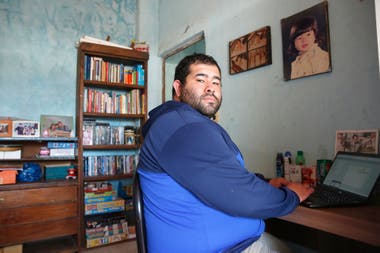
The one speaking on the other side is Esequiel Gómez (30), who has had the service since March. He lives with his girlfriend and their two children, and works in the purchasing department of a prepaid medicine. In front of the computer, Esequiel sits hunched over, rests his fingers on the keys, tries to connect to Wi-Fi to send an email but the page never finishes loading.
He says that working from home was a “rare” and difficult experience. In order to reach a balance between the family and the work, he had to “row” it: in a short space of time it was added that I had no network connection nor a notebook. “Thanks to Hayder’s installation and the machine they gave me, I could continue working. If not, I could never work from home. I have acquaintances who lost their jobs due to lack of connectivity,” he says. In his room-office, there are photos of the family, two large beds glued together, ordered toys and several children’s books. While the computer screen lights up his face, Esequiel grabs the cell phone.
-Hayder, I did what you told me. It started to work better, crazy. Thank you.
On the other side of the line, the grill no longer smokes, only traces of grease and hot ashes remained, and the table with empty plates. Hayder adjusts his visor and rolls up his sleeves. He still has the rest of the work day left and his cell phone is almost out of battery. Complain again, but move on.
According to the criteria of
More information
.
Publicado en el diario La Nación

